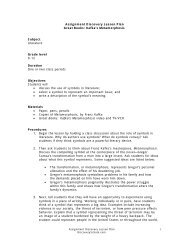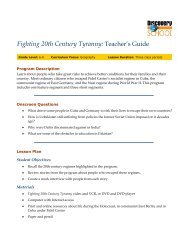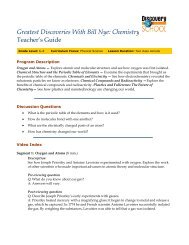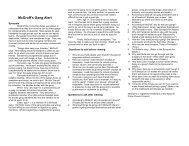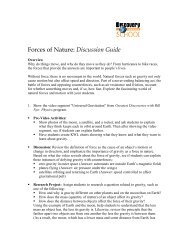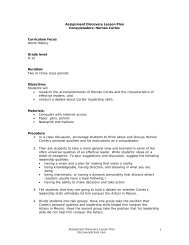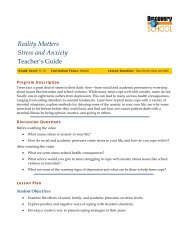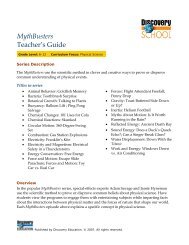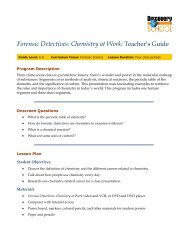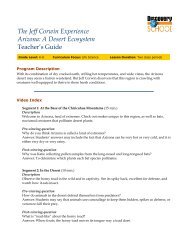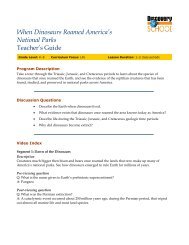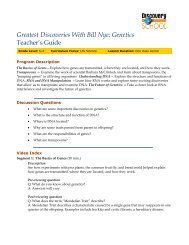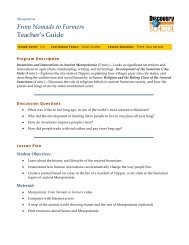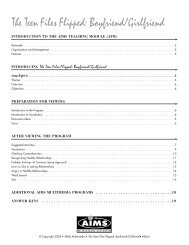Discovering History 20th Century Biographies:World Statesmen ...
Discovering History 20th Century Biographies:World Statesmen ...
Discovering History 20th Century Biographies:World Statesmen ...
Create successful ePaper yourself
Turn your PDF publications into a flip-book with our unique Google optimized e-Paper software.
<strong>20th</strong> <strong>Century</strong> <strong>Biographies</strong>: <strong>World</strong> <strong>Statesmen</strong><br />
Teacher’s Guide<br />
• “The weak can never forgive. Forgiveness is the attribute of the strong.”<br />
• “They cannot take away our self-respect if we do not give it to them.”<br />
• “It may be long before the law of love will be recognized in international affairs. The<br />
machineries of government stand between and hide the hearts of one people from those of<br />
another.”<br />
8. Nobel Prize: Alfred Nobel was a famous inventor and endowed the prizes that bear his name.<br />
Each year on December 10—the anniversary of Nobel’s death—an award ceremony is held in<br />
Oslo, Norway, and a new selection of Nobel laureates receives a medal, a diploma, and a<br />
monetary prize. Have students use print and Web resources to learn more about the man<br />
behind this highly regarded award: Who was Alfred Nobel? Where was he born? Why did he<br />
grow up in Russia? While studying in Paris, what substance did Alfred Nobel become<br />
interested in? How did he think it could be used? How did he formulate dynamite? Why was<br />
Nobel once described as “Europe’s richest vagabond”? What do the Nobel Prizes reward?<br />
When was the first prize awarded? There are six Nobel Prize categories. What are they? Why is<br />
a peace prize included as one of the categories? How do awards like the Nobel Prize encourage<br />
excellence? In the students’ opinion, are awards such as the Nobel Prize important? Which of<br />
the statesmen portrayed in the video received the Nobel Peace Prize? For what achievement?<br />
The following Web sites provide useful information:<br />
• Alfred Nobel’s Life and Work<br />
http://nobelprize.org/nobel/alfred-nobel/biographical/life-work/gradeschool.html<br />
• Nobel Prize <strong>History</strong><br />
www.infoplease.com/spot/99nobel1.html<br />
9. Written report: Ask students to select one of the five statesmen presented in the program for<br />
further research. Assign them to write a report summarizing their findings. The report should<br />
include a paragraph concerning the statesman’s accomplishments and legacy as well as a final<br />
opinion paragraph discussing the overall success or failure of his leadership. The required<br />
length of reports should be tailored to the students’ age and grade level.<br />
Assessment<br />
Use the following three-point rubric to evaluate students’ work during this lesson.<br />
• 3 points: Students effectively analyzed and discussed the Munich Pact, the Nobel Prize,<br />
traits of leadership, and each of the statesmen in all contexts requested, conducting all<br />
required research in preparation; demonstrated a clear grasp of places and events through<br />
the use of maps; produced a complete report about a statesman, including all of the<br />
requested information.<br />
• 2 points: Students analyzed and discussed the Munich Pact, the Nobel Prize, traits of<br />
leadership, and each of the statesmen in most contexts requested, conducting most required<br />
research in preparation; demonstrated an adequate grasp of places and events through the<br />
use of maps; produced a satisfactory report about a statesman, including a major portion of<br />
the requested information.<br />
Published by Discovery Education. © 2006. All rights reserved.<br />
4



